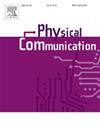无人机驱动的任务卸载和无线电力传输:边缘计算中lyapunov优化和强化学习的融合
IF 2
4区 计算机科学
Q3 ENGINEERING, ELECTRICAL & ELECTRONIC
引用次数: 0
摘要
由于无人机灵活的机动性和广泛的服务覆盖范围,无人机辅助边缘计算正日益成为一项有前景的技术。地面物联网设备(IoTD)的计算资源和电池容量往往不足以支持高速稳定的本地计算。此外,复杂的环境条件和电磁干扰严重影响服务器与边缘设备之间的信道质量。针对上述情况,本文研究了一种时变无线信道条件下,空中无人机向地面IoTD提供任务卸载和无线功率传输(WPT)的服务架构。将整个系统表述为马尔可夫决策过程(Markov Decision Process, MDP),利用Lyapunov优化理论建立合理的目标函数,保持系统任务队列的稳定性。提出了一种Lyapunov优化双延迟深度确定性策略梯度(LyTD3)算法。该算法旨在优化任务卸载和WPT决策,同时保持系统任务队列的稳定性,获得更好的系统效用。我们已经验证了该算法的收敛性。实验结果表明,经过训练后,该算法模型能够对任务卸载和WPT做出合理的决策。对比实验进一步验证了LyTD3算法的优越性,表明其在性能和稳定性方面都优于其他优化方法。本文章由计算机程序翻译,如有差异,请以英文原文为准。
UAV-driven task offloading and wireless power transfer: a fusion of lyapunov optimization and reinforcement learning in edge computing
Due to the flexible mobility and extensive service coverage of Unmanned aerial vehicle (UAV), UAV-assisted edge computing is increasingly emerging as a promising technology. The computational resources and battery capacity of ground Internet of Things Devices (IoTD) are often insufficient to support high-speed and stable local computing. Additionally, complex environmental conditions and electromagnetic interference severely impact the channel quality between servers and edge devices. In view of the above circumstances, this paper investigates a service architecture where aerial UAV provide task offloading and Wireless Power Transfer (WPT) to ground IoTD under time-varying wireless channel conditions. The entire system is formulated as a Markov Decision Process (MDP), and Lyapunov optimization theory is utilized to establish a reasonable objective function to maintain the stability of the system's task queue. A Lyapunov Optimized Twin Delayed Deep Deterministic Policy Gradient (LyTD3) algorithm is proposed. This algorithm aims to optimize task offloading and WPT decisions while maintaining the stability of the system’s task queue and achieving better system utility. We have verified the convergence of the proposed algorithm. Experimental results show that the algorithm model can make reasonable decisions on task offloading and WPT after training. Comparative experiments further validate the superiority of the LyTD3 algorithm, demonstrating that it outperforms other optimization methods in terms of performance and stability.
求助全文
通过发布文献求助,成功后即可免费获取论文全文。
去求助
来源期刊

Physical Communication
ENGINEERING, ELECTRICAL & ELECTRONICTELECO-TELECOMMUNICATIONS
CiteScore
5.00
自引率
9.10%
发文量
212
审稿时长
55 days
期刊介绍:
PHYCOM: Physical Communication is an international and archival journal providing complete coverage of all topics of interest to those involved in all aspects of physical layer communications. Theoretical research contributions presenting new techniques, concepts or analyses, applied contributions reporting on experiences and experiments, and tutorials are published.
Topics of interest include but are not limited to:
Physical layer issues of Wireless Local Area Networks, WiMAX, Wireless Mesh Networks, Sensor and Ad Hoc Networks, PCS Systems; Radio access protocols and algorithms for the physical layer; Spread Spectrum Communications; Channel Modeling; Detection and Estimation; Modulation and Coding; Multiplexing and Carrier Techniques; Broadband Wireless Communications; Wireless Personal Communications; Multi-user Detection; Signal Separation and Interference rejection: Multimedia Communications over Wireless; DSP Applications to Wireless Systems; Experimental and Prototype Results; Multiple Access Techniques; Space-time Processing; Synchronization Techniques; Error Control Techniques; Cryptography; Software Radios; Tracking; Resource Allocation and Inference Management; Multi-rate and Multi-carrier Communications; Cross layer Design and Optimization; Propagation and Channel Characterization; OFDM Systems; MIMO Systems; Ultra-Wideband Communications; Cognitive Radio System Architectures; Platforms and Hardware Implementations for the Support of Cognitive, Radio Systems; Cognitive Radio Resource Management and Dynamic Spectrum Sharing.
 求助内容:
求助内容: 应助结果提醒方式:
应助结果提醒方式:


